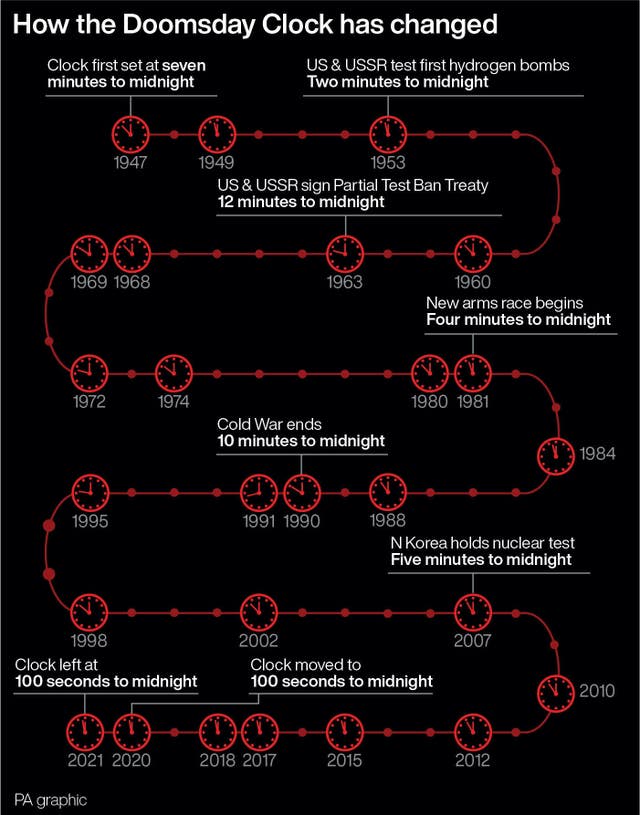Doomsday Clock remains at closest point ever to midnight
The coronavirus pandemic is cited as one of the main reasons why the clock’s position has not changed this year.

The Doomsday Clock has remained at 100 seconds, staying the closest to midnight it has ever been for the second year running.
The countdown acts as a metaphor for global apocalypse, taking into account the likelihood of emerging threats such as climate change and advances in biotechnology and artificial intelligence.
Maintaining last year’s position means the clock’s keepers believe the threat has not cooled off in the past 12 months, citing the ongoing coronavirus pandemic as one of the reasons for this year’s count.
Rachel Bronson, president and chief executive of the Bulletin of the Atomic Scientists, which is responsible for the clock, said: “We recognise that humanity continues to suffer as the Covid-19 pandemic spreads around the world.
“The pandemic revealed just how unprepared and unwilling countries and the international system are to handle global emergencies properly.
“In this time of genuine crisis, governments around the world too often abdicated responsibility, ignored scientific advice, did not co-operate to communicate effectively and consequently failed to protect health and welfare of their citizens.”
Having now killed more than two million people across the world, the group say Covid-19 is an unmistakable “wake-up call” for world leaders.
Scientists are also concerned about accelerating nuclear programmes in multiple countries, which they blamed for moving the world into “less stable and manageable territory” last year, as hypersonic glide vehicles, ballistic missile defences, and weapons-delivery systems were developed.

They said: “Events like the deadly assault earlier this month on the US Capitol renewed legitimate concerns about national leaders who have sole control of the use of nuclear weapons.
“Nuclear nations, however, have ignored or undermined practical and available diplomatic and security tools for managing nuclear risks.
“By our estimation, the potential for the world to stumble into nuclear war – an ever-present danger over the last 75 years – increased in 2020.”
Scientists did have some hope that tensions could be eased, with new US President Joe Biden’s intention to rejoin the Paris Agreement and stay in the World Health Organisation mentioned as positives.
The countdown was established in 1947 by experts at the bulletin who were working on the Manhattan Project to design and build the first atomic bomb.
It started at seven minutes to midnight.
The bulletin is an independent non-profit organisation run by some of the world’s most eminent scientists, which was originally intended to warn of the threat of nuclear Armageddon.





